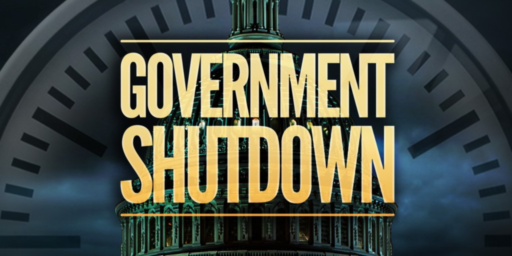Trump to Propose Merger of Education, Labor and Consolidation of Welfare Programs [UPDATED]
The Administration is going to unveil a plan for a major reorganization of government agencies today.

The Hill (“White House to recommend combining Education, Labor Departments: report“):
The proposed merger, which is expected to be unveiled Thursday morning, would mark a significant step toward the Trump administration’s goal of decreasing the federal workforce.
The Education Department, which has already shrunk under the Trump administration, employs around 3,900 people, making it one of the smallest federal agencies. The Labor Department employs roughly 15,000 workers, according to the newspaper.
Officials for the White House and Labor Department declined to comment to the Journal, and the paper could not immediately reach the Education Department for comment.
Lawmakers would have to approve the reorganization, but have demonstrated reluctance for such measures before.
The merger would be part of a broader effort to reshuffle the federal government.
The above is based on the original reporting of the WSJ, which is behind a paywall. Nosing around a bit, I found a POLITICO story (“Trump seeks to reorganize the federal government“) from earlier in the month that I missed at the time:
The Trump administration is preparing to release a sweeping plan for reorganizing the federal government that includes a major consolidation of welfare programs — and a renaming of the Health and Human Services Department.
The report, set to be released in the coming weeks by the White House Office of Management and Budget, seeks to move safety-net programs, including food stamps, into HHS, two sources with knowledge of the plan told POLITICO. The plan would also propose changing the name of the sprawling department, while separately seeking cuts at the U.S. Agency for International Development and the State Department.
The $70 billion food stamp program, formally known as the Supplemental Nutrition Assistance Program, is run by the Agriculture Department and makes up the vast majority of the department’s budget. The program helps more than 40 million low-income Americans buy groceries each month.
“You have low-income assistance in a bunch of different shops without one point of oversight and without a whole lot of communication,” said one of the people with knowledge of the plan. “Why not have one federal agency responsible for execution?”
The report, which is expected to recommend big changes at many federal agencies, is almost complete and is expected to be introduced this month, according to one administration official. Sources in and outside the government have been told the rollout will happen in late June. The plan is still being finalized and some of the details could change, but one of the people familiar with the report said the proposal to reorganize HHS has widespread buy-in at OMB.
OMB spokesman Jacob Wood declined to comment on the plan.
The biggest changes outlined by the White House are unlikely to be implemented because moving multibillion-dollar programs and renaming federal departments generally requires congressional action. But the plan, like the president’s annual budget, demonstrates the administration’s thinking on a range of domestic policy issues. It also offers a strong political selling point for the Trump White House as it tries to burnish an image of an administration dedicated to conservative principles and smaller government.
“The administration already put a lot of stuff out in this year’s budget related to cuts, but that was the easy stuff,” the administration official said. “This [report] is the harder stuff.”
[…]
White House officials have been working on their bid to reorganize the government for months — all while keeping an unusually tight lid on the plan. The effort stems from an executive order President Donald Trump signed in March of last year directing OMB to come up with a plan to overhaul the government to make it more efficient. Only recently have some of the ideas begun to circulate outside OMB.
The plan appears to draw, at least in part, from recommendations made last year by The Heritage Foundation, the conservative think tank that has deeply influenced Trump’s agenda in his first year and a half in office.
Heritage recommended that all nutrition functions at USDA — including food stamps, nutrition education and school meal programs that serve some 30 million children each day — be transferred to HHS.
“[T]he USDA has veered off of its mission by working extensively on issues unrelated to agriculture. This is mostly due to the nutrition programs,” Heritage wrote in last year’s report about reorganizing the government. “By moving this welfare function to HHS, the USDA will be better able to work on agricultural issues impacting all Americans.”
While I would have to see the actual plan to form a strong opinion, the basic concept strikes me as a good one. With the exception of the post-9/11 creation of the Department of Homeland Security, merging a lot of functions that were scattered throughout the government into a single agency, we really haven’t had a significant reorganization of the federal government since the Carter Administration.
Offhand, merging all of our social welfare programs into a single agency makes a lot of sense. Democrats will naturally be skeptical of doing this under a Republican Administration—let alone that of Donald Trump—but it could certainly be done in a way that brings efficiency and clarity to the mission and actually improves services to the needy.
While I’ve long thought we should merge our various economic agencies (Treasury, Commerce, and Labor) I can’t offhand come up with a rationale for merging Education and Labor. But it’s possible that a good one will be proffered.
Beyond the merits, I’m incredibly skeptical about the timing. Not so much that this will be seen as an attempt to distract from Trump’s various scandals—pretty much anything he does is subject to that charge—but because this really should have been done a year ago. A normal administration comes to office with policy ideas that have been essentially crafted into legislative proposals. That allows them to get some wins during the “honeymoon” period in the first few months after they’ve been sworn in. To be sure, the “honeymoon” has been short to nonexistent in recent presidencies, certainly to include this one. But it’s exceedingly difficult to get anything controversial passed in election years and we’re now just a few weeks from midterms that could put the Democrats in control of the Congress. It’s just about inconceivable, then, that they’ll give Trump a win at this juncture.
UPDATE: The plan has been announced and WaPo (“Exactly what Trump’s new plan says about merging the Education and Labor departments“) has details. BLUF, the prospects are even grimmer than I portrayed originally:
The Trump administration Thursday issued its plan to reorganize the federal government, which includes merging the Education and Labor departments.
Such a merger is not likely to be approved by Congress: Democrats oppose it, and enough Republicans are expected be against the proposal that it will be doomed — if it ever gets to a vote. But the proposal reflects long-standing Republican opposition to the existence of the Education Department.
A key Republican voice in the Senate is Lamar Alexander of Tennessee, who heads the Senate education committee and was education secretary under President George H.W. Bush. This was his underwhelming reaction to the Trump proposal: “I think it’s always wise to look for greater efficiency in how our government operates and I will study the proposal carefully.”
Teacher union leaders and Democrats in Congress blasted the idea. Lily Eskelsen García, president of the National Education Association, the country’s largest union, called a proposed merger of Education and Labor “radical” and said in a statement that the Trump administration’s proposals are “at best ill-conceived and poorly timed and at worst are an attempt to distract the American public from the humanitarian crisis [President Trump] created along the U.S.-Mexico border.”
Randi Weingarten, president of the American Federation of Teachers, said that “in any normal administration,” it would make sense to combine some “core functions” of the two departments.
“But there is nothing normal about this administration, so we’re extremely skeptical of the motivations here given how hostile Betsy DeVos and President Trump have been to public education, workers and unions,” she said in a statement, referring to Trump’s education secretary. “It seems like this move is just cover for continuing their agenda to go after public schools, gut civil rights and equity protections, provide support for predatory student loan companies and prey on workers.”
Sen. Patty Murray (D-Wash.), the highest-ranking Democrat on the Senate education committee and who has worked well on some initiatives with Alexander, called the plan “unrealistic, unhelpful and futile.
“Democrats and Republicans in Congress have rejected President Trump’s proposals to drastically gut investments in education, health care, and workers — and he should expect the same result for this latest attempt to make government work worse for the people it serves,” she said in a statement.
The piece then embeds the proposal for the merged “Department of Education and the Workforce,” including the org chart. Thus far, nothing is on the White House website.






So if this actually happens under Trump, which I tend to doubt, does that mean Alex Acosta and Betsy DeVos have to fight it out for the top spot Apprentice-style?
On a broader note, I tend to agree that we could do with some consolidation at the cabinet level (I like the idea of bringing the Treasury, Commerce, and Labor Departments under one umbrella, for example) but I don’t see Trump as being the kind of person that could guide such a reorganization through Congress.
I also would note that Republicans have been trying to eliminate the Dept. of Education since the Reagan Era. I doubt it will succeed this time.
Farmer groups and trade and commodity associations won’t let trump move SNAP (formerly Food Stamps) and school meal programs from USDA. They like the status quo. It seems that trump’s rural supporters are already feeling the heat from his bone-headed trade wars, and he ignores them at his peril.
indeed. A great way to end some of that waste, fraud, and abuse.
Kind of like how every agency has to have it’s very own Green initiative division. If you must have that, have one.
Re:Doug, this might have a better shot since it doesn’t totally eliminate the Dept of education.
@mwh191: did you see that Germany is now calling for the elimination of all automobile tariffs between it and the US?
@mwh191:
What you mean is that they like The Norms.
And Trump is trashing those. Which is good.
@TM01:
Yes, those Germans completely capitulated:
Says a foreign trade expert at the Federation of German Industries:
When you are trying to sell a company off or take it public, one technique is to take all the product lines that are unattractive, mash them together and spin that off as a separate company. The rationale for mashing these agencies is similar: move all the hated departments into one bathtub where they can be safely drowned. Republicans have hated the Education Department since the feds were involved in school desegregation. Republicans have hated any welfare program once they started benefitting brown people and not just poor whites. And Republicans have hated the Labor department since it was created because they are a party based on class grievances even more than racial ones. Nothing sticks in a Republican’s craw so much as laborers getting above their station and putting on airs.
I would just add, for the elite funders of the GOP it’s about class. They get their poor dumb footsoldiers amped up by using race.
@MarkedMan: And they don’t want those big gubbermint regulators having the nerve to stop businesses from injuring and killing their employees with those evil OSHA standards.
Republicans and, in general, people who identify as conservatives are pretty blind to this. A CEO or a private equity firm such as Romney’s Bain can drive a company into the ground while looting it and even they are likely to be lauded as giants of the industry. Some of it is just ignorance – most people look at rich businessmen and assume they are Edisons or Fords or Watson’s, innovators who can found and steer emerging empires, but the reality is that most of them are just really well payed employees. And the Republican / Conservative mindset really leans in this direction. So it is possible to explain their infatuation with rich businessmen by this confusion. But that doesn’t explain their visceral reaction to the very concept of workers banding together to improve their lot.
There is a type of logic puzzle called the lateral thinking puzzle. It starts with an impossible scenario and then asks you to explain it (ex: A man lies dead in the middle of a forest. He’s wearing scuba gear. How did he die?). You are allowed to ask yes/no questions indefinitely. Eventually you can narrow it down to the point you can solve it. (Was there a lake in the forest? No.) What I love about them is that once you think of the answer, you instantly know it is correct. All the frustrating questions you asked, with answers that seemed to make no sense, effortlessly click into place.
It is that way with Republicans / Conservatives. If we take them at their word they abound with hypocrisies. (The NRA defends all cases where people are sanctioned when carrying a legitimate hand gun, even very, very questionable ones. But they didn’t defend Philando Castile. Why?) But if we find the real narrative, it easily explains virtually all of their positions. In the case of Conservatives, it is that most people that apply that label to themselves have no real political philosophy, but rather are motivated by anger and resentment people of lower class getting above themselves. (Philando Castile was black.) Once you take that as their primary motivator all those frustrating rationalizations fall away and the answer is obviously correct.
Merging Departments is a horrible idea. The Homeland Security Department is so large that is basically unmanageable and the United States already has fewer cabinet posts than most other countries, either in the OECD or in Latin America.
Removing redundancies under the guise of “efficiency” isn’t always a good idea. They’re often redundancies for a reason. While the idea of have one standard to be held to is very clean and appealing, it also means there’s only one thing to control to get your way. It’s why we still have 50 state governments instead of one all-powerful federal government – consolidation gives away the ability to limit the damage of bad decisions made by larger entities.
Handing over the nutrition programs to Labor then gives them final say on content, for instance. It also gives them to opportunity to push certain items that might not be nutritionally optimal but good for American businesses. Are we still going to tell kids about how corn syrup in everything isn’t the best idea? What about pushing red meat instead of discussing vegetarian options? Conflicting priorities asks who gets the benefit – the child or the farmer? Don’t bother – we all already know.
Frankly, this whole thing is so they can kill Education, inch by inch if they have to. They’re trying it with the Post Office and look how that’s going. Streamlining is easy and a fantastic idea when there’s real dead weight to remove. Slapping together two tangentially related departments is an effort to get rid of one or both without upsetting the apple cart.
I don’t think Trump has the skills, intelligence, or basic level of competence to reorganize the government. To wreck it, yes. And likely that’s the intent.
Consider this:
When there are important diplomatic initiatives like North Korea, you really want to spend less money on diplomacy.
And while I consider the tariffs and trade war akin in stupidity to that which brought us WWI (in kind if not in intensity), if you are going to engage in that, you’d best have a sharp foreign service to protect your interests when your allies will be pissed and seeking to retaliate by any means.
Perhaps someone can tell Cheeto Benito, wince he doesn’t seem to know this, that sovereign countries don’t run either their domestic or foreign policies for the benefit of the United States, and much less for the benefit of the Cheeto’s base.
I doubt anything will come of this. As a rule Trump’s initiatives go nowhere. Announcing is easy, doing is hard, and Trump never does anything hard.
This is clearly a winning proposal for almost all Republicans and probably most independents. And people, to be honest, are ignoring every new scandal coming from this Administration, it’s just too much to follow. Unfortunately it’s going to put Democrats in a tough position if they gain some control this Fall.
@MarkedMan: If one wanted to look for a more benign rationale, it might be that the merger could be related to the reality that at the state level, the Departments of Labor play significant roles the various school reform schemes that periodically rise from the ashes of the previous big idea and have significant input into how Common Core is evaluated for goals. Of course, looking for a benign rationale in anything that Republicans do these days is a fool’s errand, and I doubt that Trump or OMB actually KNOWS about what either department does sufficiently to make a thoughtful decision or policy.
@MarkedMan:
At the root of Conservative ethos is the myth that the world is untimately meritocratic so that anyone can become “da man (!!)”. Rules and processes that result in the peons being able to improve their lot are, therefore, antithetical to the desires of those who see themselves as the future rulers–and as a consequence, rightful oppressors– of those same peons.
It was either Gabriel Garcia Marquez or Octavio Paz, I think, who opined years ago that the reason that it is so difficult to find true reform governments in Latin America because the region has a half millenia history of rule by kleptocrats. As such, each government that arises does so with the vision that it is now “their turn” to pillage the society. I would go farther and note that this is also a feature of human nature in general. This belief forms part of the rationale for not electing Trumps or Hillaries in the first place and explains why so many decent philosophies run afoul of the problem that they are dependent on the quality of the people living them.
Ya want better policy? Ya need better people–morally, not intellectually.
@Just nutha ignint cracker:
Yep
And that plan is to try to have the base forget yesterday’s fiascos… or the day before’s… or last week’s. Or last month’s. Or Mueller.
@Just nutha ignint cracker:
Another aspect is they see it as insulting to the notion of rugged individualism. For many, it’s an affront to the idea that they aren’t capable enough to do it on their own and have to ask for help. That’s why they talk about dues in terms of stealing or forced donations; they totally could have done it all themselves so why are they paying these guys to do it for them? They don’t want to acknowledge they’re rather replaceable in the long run and mediocre at best in getting an optimal deal.
Think of the DIY crowd resenting having to pay a group of professionals to do something they’re convinced they can accomplish easily. They really believe they are just as good and can do it cheaper…. until somebody needs to hire a plumber to fix what they broke. If most people were as good a negotiator as they think they are, the average national salary would be six figures with two months off standard. Half of American can’t win an argument with the spouse most of the time but they want to argue for higher pay and benefits?
Rugged Individualism is a naive fantasy.
They should also move the Federal Tricycle Safety Agency in that too.
While they are at it they should move the Civil War survivors benefits office to the Veterans bureau.